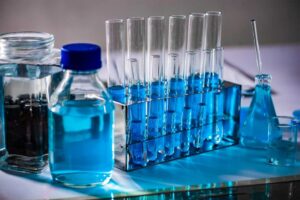Polyvinylidene Difluoride, or PVDF, has emerged as a key player in the realm of sustainable technology. With its remarkable properties and versatility, PVDF is paving the way for innovative solutions across various industries. In this comprehensive guide, we will explore how PVDF contributes to sustainable technology, its applications, environmental benefits, and the future it holds in fostering a more eco-friendly world.
1 المقدمة

Understanding Sustainable Technology
Sustainable technology, often referred to as “green technology” or “clean technology,” encompasses innovations that aim to address environmental challenges while maintaining economic viability. These technologies focus on reducing resource consumption, minimizing pollution, and promoting long-term environmental sustainability.
The Role of PVDF in Sustainability
Polyvinylidene Difluoride (PVDF) is a thermoplastic polymer renowned for its exceptional properties, making it a prime candidate for sustainable technology applications. Its chemical composition and versatility make it an asset in various environmentally-conscious endeavors.
2. خصائص PVDF
Chemical Composition
PVDF is composed of carbon, hydrogen, and fluorine atoms, resulting in a robust and chemically resistant structure. Its molecular formula is (CH2CF2)n, and this unique composition contributes to its sustainability benefits.
القوة الميكانيكية
PVDF boasts impressive mechanical properties, including high tensile strength and toughness, making it suitable for applications requiring structural integrity and longevity.
الاستقرار الحراري
With the ability to withstand a wide range of temperatures, PVDF remains stable from -40°C to 150°C, ensuring reliability in extreme conditions.
مقاومة كيميائية
PVDF exhibits exceptional resistance to a variety of chemicals, rendering it a valuable material for applications involving corrosive substances.
الخصائص الكهربائية
PVDF serves as an excellent electrical insulator, maintaining its electrical properties even at high temperatures. This feature is crucial in electrical and electronics applications.
3. Applications of PVDF in Sustainable Technology
Solar Energy Harvesting
Photovoltaic Panels
PVDF plays a pivotal role in the solar energy sector. It is used in photovoltaic panels to encapsulate solar cells, protecting them from environmental factors and enhancing their efficiency. PVDF’s UV resistance and durability contribute to the longevity of solar installations.
Solar Water Heaters
PVDF-based coatings on solar water heaters aid in heat retention, reducing energy consumption and promoting the use of renewable energy sources for water heating.
Water Treatment and Filtration
Membrane Filtration
PVDF membranes are employed in water treatment systems to separate contaminants from water, offering an energy-efficient and sustainable solution for purifying drinking water and treating wastewater.
Energy Storage Solutions
Lithium-Ion Batteries
In energy storage, PVDF-coated electrodes enhance the performance and lifespan of lithium-ion batteries, contributing to the widespread adoption of renewable energy storage solutions.
Sustainable Construction
الطلاءات المعمارية
PVDF-based coatings are utilized in sustainable construction to protect buildings from environmental stressors, reduce maintenance requirements, and enhance energy efficiency.
Insulation
PVDF’s thermal insulating properties contribute to sustainable construction by improving energy efficiency in residential and commercial buildings.
Biomedical Innovations
Medical Implants
PVDF’s biocompatibility makes it suitable for medical implants, ensuring that these devices are sustainable in the human body without adverse reactions.
أنظمة توصيل الأدوية
PVDF is utilized in drug delivery systems, allowing for controlled release of medications, reducing waste, and improving patient treatment outcomes.
4. Environmental Advantages of PVDF

Reduced Carbon Footprint
PVDF’s role in solar energy generation and energy storage solutions helps reduce the carbon footprint by decreasing reliance on fossil fuels.
Longevity and Durability
PVDF’s durability ensures that products and structures made with it have a longer service life, reducing the need for frequent replacements and conserving resources.
Recyclability and Waste Reduction
While recycling PVDF is challenging, ongoing research aims to develop sustainable recycling methods, potentially reducing the environmental impact of PVDF production.
كفاءة الطاقة
PVDF’s electrical and thermal properties contribute to the energy efficiency of various applications, reducing overall energy consumption.
5. Challenges and Future Developments
تحديات المعالجة
Processing PVDF can be energy-intensive, and finding sustainable manufacturing methods remains a challenge.
Research and Innovations
Ongoing research focuses on making PVDF production more environmentally friendly and exploring new applications to advance sustainability.
توسيع التطبيقات
As technology evolves, PVDF is likely to find new and innovative applications that further contribute to sustainability efforts.
6. FAQs About PVDF and Sustainability
Is PVDF considered an eco-friendly material?
PVDF is considered eco-friendly in some applications due to its longevity, durability, and contributions to renewable energy. However, its production and disposal can raise environmental concerns.
How does PVDF contribute to renewable energy?
PVDF plays a crucial role in the solar energy sector by encapsulating solar cells, protecting them from environmental factors, and enhancing their efficiency. It also improves the performance and lifespan of lithium-ion batteries used in renewable energy storage.
Can PVDF be recycled in a sustainable manner?
While PVDF recycling options are limited, ongoing research aims to develop sustainable recycling methods, which could reduce the environmental impact of PVDF production.
What role does PVDF play in reducing greenhouse gas emissions?
PVDF’s contributions to solar energy and energy storage solutions reduce the reliance on fossil fuels, ultimately helping to mitigate greenhouse gas emissions.
How is PVDF being used to promote sustainability in the construction industry?
PVDF-based coatings and insulation materials improve the energy efficiency and durability of buildings, contributing to sustainability in the construction sector by reducing energy consumption and maintenance requirements.


